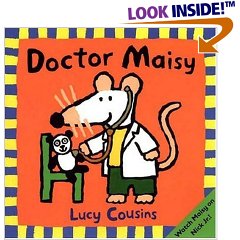
Amie (19 mos.) is enamored with Maisy, the adorable mouse created by Lucy Cousins (Candlewick Press).
“Maaa-isy Maaa-isy,” Amie calls. Then: “Mama read!” or “Amie read!”
Simplicity is the norm
The stories are short and sequential. The language is sparse, and keywords are repeated often. The bright colors filling large fields surrounded by black lines appeal immediately to a young child’s eye. There is no superfluous detail in the imagery and a minimum of background. The 2D perpective and the simplicity, even stiffness, of the characters too ensure concentration upon the essentials.
AÂ role for the reader
Sounds boring? Not so. There is plenty to do for the caregiver introducing and reading the books to the child. That’s what I, personally, like best about Maisy.
- There is a great deal of play with contrasts between action and rest, dialogue and description, humor and seriousness. This asks for a lot of voice modulation and even gestures (“Yawn…”, “Boom!”, “Here, chickens!”).
- Often the reader needs to elaborate or even add a key event to the story. In Doctor Maisy, for instance, the actual crash of Maisy bumping into Tallulah isn’t pictured, and it’s best to do a little song-and-dance yourself while you turn to the next page, which features both creatures alreadysitting down on the floor. The minimality of the stories certainly leaves plenty of room for growing as the book and the child grow older.
- The story lines are very recognizable to the child: breakfast, bedtime, farm animals, driving a bus, gift-giving (“Thank you, Maisy!”). They are great openings to discussions about parallel situations in the child’s life.
InteractionÂ
In short, reading Maisy with your child is bound to get you interacting with your little one. If only because you’re reading it for the hundredth time and you need to spice it up for yourself!
Age-group
And this is Maisy’s biggest plus: these are stories for small children, those crossing the border from infancy into toddlerhood. There is adventure, friendship, small (pretend) illnesses, nothing more abstract than that, and plenty to discuss in their newly acquired voices and words.
Amie no longer needs me to fill in the blank in Doctor Maisy. She sits down on the sofa next to me and reads to her Bear: “Maisy run down (s)teps! No(t) so fast! Crash Maisy Tallulah! Boom! O no Maisy hu(r)t nose! That(‘s) better!”